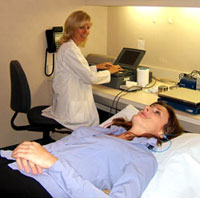Electrocochleography-ECoG
Electrocochleography is an objective measurement of the electrical potential of the cochlea – a snail-shaped organ in the inner ear responsible for turning sound into nerve impulses. We utilize non-invasive recording electrodes, which consist of gold-foil ear tips which are inserted into the ear canal and cause little or no discomfort to the patient. Another electrode is placed on the forehead, at which time the patient simply lies down on a table and listens to a series of loud clicking noises. No response is required from the patient – you can even sleep during the test if so desired. A typical ECoG usually takes around 45 minutes to complete.


ECoG is used to diagnose, assess and monitor Meniere’s disease (endolymphatic hydrops). The symptoms of Meniere’s disease include episodic vertigo, hearing loss, aural fullness and tinnitus, although the presence and severity of these symptoms vary among individuals.



